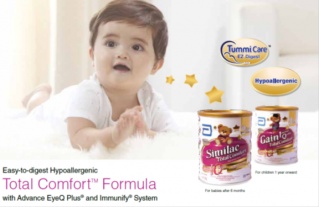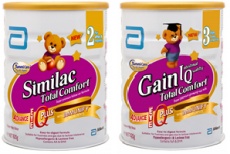Navigating the Issue of Feeding Intolerance
Breast milk is the best source of nutrition for babies and young children. Aside from being nutritionally complete, it is also easily digested and well-tolerated. Children fed breast milk are therefore less likely to experience symptoms of feeding intolerance, compared to those given formula milk.

Marketing research conducted among mothers, including those in Singapore, found that 2 out of 3 children on formula milk experience common feeding problems such as spit-up, gas, fussiness, colic, constipation and eczema. In general, some babies and young children find it difficult to tolerate formula milk because their digestive system is still growing and maturing. (Source:* Abbott global tolerance survey 12/08, n=5000 / Base: all respondents (including Singapore respondents)
Zooming in on common feeding tolerance issues

Spit-Up
Spit-up, or regurgitation, is an effortless (involuntary) return of stomach contents into the mouth. Spit-up generally peaks in the early months of life and tapers off by about one year of age. Most babies with spit-up are healthy and normal.
“Babies do tend to spit out a bit of milk every now and then,” said Professor Quak Seng Hock, a senior consultant and head of the Division of Paediatric Gastroenterology and Hepatology in National University Hospital. However, if the spit-up occurs frequently and your child is experiencing pain, breathing difficulties and poor growth, you should bring your child to a paediatrician for further examination.
Helpful hints
Mild to moderate cases of spit-up can often be frustrating and annoying for parents. You may be able to reduce the frequency of spit-up by:
· Burping your child during and after feeding
· Feeding before the child gets very hungry, to avoid rapid milk intake
· Avoiding excessive movement during and immediately after feeding
Check with your doctor about the use of milk formula which is specially designed to help decrease the frequency of regurgitation.
 Gas/ Fussiness
Gas/ Fussiness
A child disturbed by gas in the tummy may show excessive fussiness during and after feeding, pulls his legs towards the chest and appears bloated. This may be caused by swallowed air or due to lactose sensitivity (trouble digesting lactose i.e. milk sugar). “Lactose sensitivity can cause symptoms such as fussiness, gas, spit-up, abdominal pains and cramps. This happens when the bacteria in baby’s large intestine ferments non-digested lactose to produce gas and other compounds,” explained Dr Nancy Tan, a paediatrician at SBCC Baby and Child Clinic, Gleneagles Medical Centre.
Helpful hints
You may be able to comfort your child by:
· Burping him once every 5 minutes after every ounce of milk formula
· Massaging your child’s tummy or bouncing him or her gently on your lap as if he or she was on a car ride
· Providing a lactose-free milk formula
 Colic
Colic
If your baby experiences episodes of irritability, fussing or crying that begin and end for no apparent reason and last at least 3 hours a day, at least 3 days a week for at least one week, he or she may have colic. According to Dr Nancy Tan, “Inconsolable crying, also known as colic, may interfere with successful feeding in a generally healthy young child under 4 months. The initiating event might be a normal physiological response, but food sensitivity, constipation, reflux or a urinary tract infection may need to be excluded.” If you think your child has colic, book a consultation with your paediatrician to rule out these possibilities.
Helpful hints
You may be able to soothe your baby by:
· Gently bouncing him, taking him for a car ride or creating “white noise” in the background (e.g. running the vacuum cleaner)
· Providing a hypoallergenic milk formula which contain hydrolysed protein (these are formulas which have their protein source broken down into smaller molecules)
A note for mums: If the crying makes you feel like you might lose control, safely place your baby in a crib and step away briefly to calm down. Ask for help from your partner or family member to get relief or rest when you need it.
 Constipation
Constipation
Your child is likely constipated when his or her bowel movement occurs less frequently than usual, and the stools are hard, dry and painful to pass. Several factors may lead to constipation such as eating solid foods for the first time, drinking too little fluids and frequent stool withholding. It could also be due to medical conditions which can disrupt healthy digestive functions. If the constipation lasts more than 2 weeks, your child should be seen by a doctor.
Consultation should be sought earlier if the constipation is accompanied by one or more symptoms such as fever, vomiting, blood in the stool, a swollen abdomen and painful cracks in the skin around the anus (anal fissures).
Helpful hints
You may be able to help alleviate the constipation by:
· Ensuring adequate fluid intake for your child
· Exercising his or her legs to break up the hardened stools in the bowels
Also, consider the use of a formula which does not contain palm olein oil. “Palmitic acid from palm olein may interact with calcium to form insoluble soaps that can affect the hardness of stools. A milk formula that is free of palm olein oil may help prevent this particular problem,” explained Dr Nancy Tan.
Eczema
The skin affected by eczema is often red, dry and itchy. Causes of eczema are actually not fully known and could be different for each child. One possible reason is the result of the child’s immune system reacting to cow milk protein in milk formula, which it recognises as foreign bodies, hence causing skin inflammation and itching. According to Dr. Liew Woei Kang, a paediatric allergist and immunologist at Gleneagles Medical Centre, preventive measures are particularly important for babies at risk of developing eczema. This would be when one or both parents have the skin condition or a history of allergies such as asthma or allergic rhinitis.
Helpful hints
While more research still needs to be carried out, hypoallergenic (hydrolysed) formula milk could be an option for the prevention of eczema in high-risk children, if breastfeeding is not possible. Recent guidelines on the management of food allergy released by the Singapore Ministry of Health state that a hypoallergenic formula can be recommended for babies with a family history of allergy who cannot be completely breastfed^. Several studies have shown that the use of hypoallergenic formulas in high-risk babies were associated with a lower incidence of eczema, with the preventive effect lasting up to 6 years of age. Nevertheless, the decision of selecting the appropriate milk formula is best made in consultation with your paediatrician.
The journey to comfort
Remember, always seek advice from your doctor if you have any doubts about the feeding intolerance that your child is experiencing – trust your parental instincts! If breastfeeding is not possible, discuss with the doctor regarding alternative sources of nourishment for your child. Besides providing relief, the choice of milk formula should also adequately support the nutritional needs of a rapidly growing child, especially that of the brain, eye and immune system. (Source: Management of Food Allergy, Academy of Medicine Singapore- Ministry of Health Clinical Practice Guidelines 2/2010, June 2010)
Easy-to-digest Hypoallergenic
with Advance EyeQ Plus® and Immunify® System

Similac Total Comfort and Gain Total Comfort are easy-to-digest hypoallergenic formulas with all the benefits of Advance EyeQ Plus and Immunify[SUP]®[/SUP]System[SUP].[/SUP]
Specially created to be gentle on tummies, Total Comfort formulas are scientifically formulated with TummiCare EZ Digest[SUP]TM[/SUP]. With these, Singapore mothers can be confident that they are giving their child the best.
•Hypoallergenic with optimized gentle proteins to reduce the allergenic potential of cow milk
• Lactose free to help relieve fussiness, gas, spit-up and diarrhoea due to lactose sensitivity
• Advance EyeQ Plus® System of essential nutrients like AA, DHA that help with his brain and eye development
• Immunify® System including nucleotides, iron and zinc to support the child’s natural defenses
• ProCalci® Formulation with easily digested fat blend without palm olein oil

Find out more by visiting Abbott Child website.
This is a paid advertisement.






